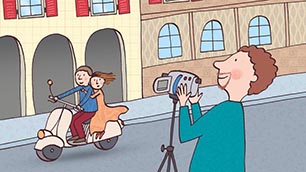I. Irregular Participles in the passato prossimo
A number of verbs have irregular past participles in the passato prossimo. This means they do not follow the conjugation rules we learned in the previous Act. Following is a list of some commonly used verbs with irregular past participles and example sentences. As a rule, these irregular participles don’t follow a rule! You will, however, notice some patterns.Be sure to note which verbs take essere as an auxiliary, and which verbs take avere.
aprireAbbiamo aperto le finestre.We opened the windows. accendereChi ha acceso le luci?Who turned on the lights? bereCarlo ha bevuto troppo ieri sera.Carlo drank too much yesterday evening. chiedereAbbiamo chiesto il conto.We asked for the bill. chiudereHo chiuso il negozio per fallimento.I closed the store due to bankruptcy. correreAvete corso cinque miglia!You ran five miles! decidereHanno deciso di rimanere qui.They’ve decided to stay here. direCosa hai detto?What did you say? essereSono stata da Roberto ieri.I was at Roberto’s yesterday. fareHai fatto bene!You did well! leggereIl nonno ha letto il giornale.Grandpa read the newspaper. mettereDove hai messo le chiavi?Where did you put the keys? morireÈ morta una settimana fa una mia amica.A friend of mine died a week ago. nascereSono nato in ottobre.I was born in October. prendereHa preso il libro dal tavolo.He took the book from the table. rimanereI ragazzi sono rimasti in macchina.The kids stayed in the car. rispondereNon mi hanno ancora risposto.They haven’t responded to me yet. scrivereClaudio ha scritto un articolo.Claudio wrote an article. spegnereHai spento il televisore?Did you turn off the television? spendereAbbiamo speso poco.We spent little money. succedereNon è successo niente.Nothing has happened. vedereSandro non ha visto il gatto.Sandro hasn’t seen the cat. vivereHanno vissuto a Milano.They lived in Milan. |





















